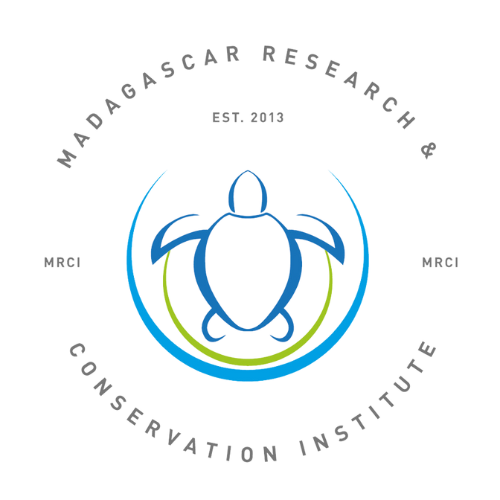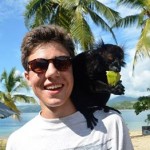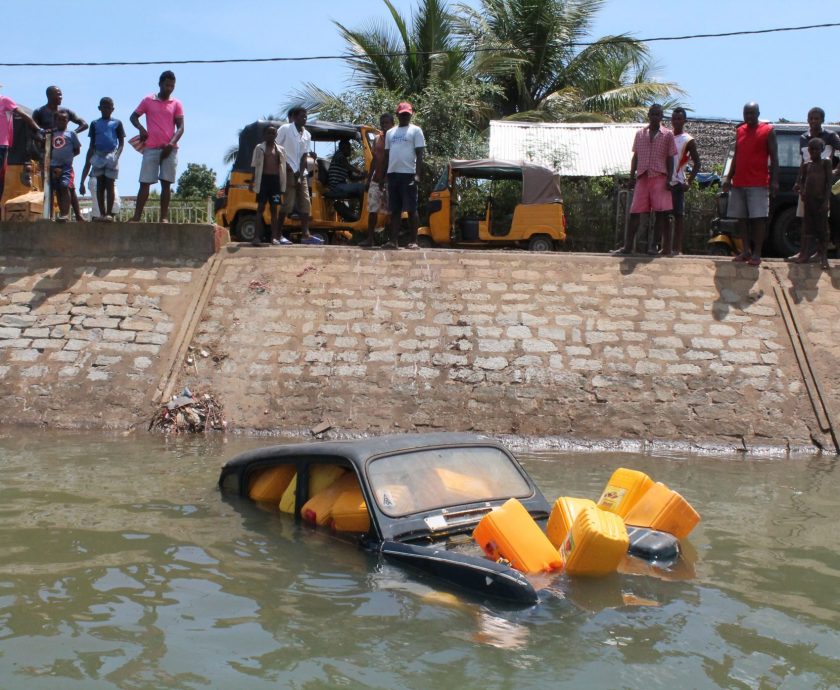The Angonoka tortoise is the world’s most endangered tortoise.
Endemic to Madagascar, the Angonoka tortoise (also known as the Ploughshare, Madagascar or Madagascar angulated tortoise) 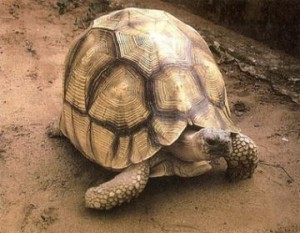 is found in only a sixty square kilometre area around Baly Bay and is one of the rarest land tortoises in the world. The terrain and plant life in this area is mixed and includes savannah, bamboo scrub, mangrove swamp and deciduous forest. The tortoises prefer the bamboo thickets.
is found in only a sixty square kilometre area around Baly Bay and is one of the rarest land tortoises in the world. The terrain and plant life in this area is mixed and includes savannah, bamboo scrub, mangrove swamp and deciduous forest. The tortoises prefer the bamboo thickets.
The Angonoka (Astrochelys yniphora) and the Radiated (Astrochelys radiata) tortoise are the only species in the genus.
Angonoka tortoises are smallish land tortoises that reach around 40 centimetres long and have brown, high-domed shells. Males can weigh over 10 kg with females averaging 8.8 kg. The name “Ploughshare” comes from one of the plates (or scutes) of the lower shell projecting out and up between the front legs (resembling a ploughshare) which male tortoises use when fighting in an attempt to flip the other tortoise over. Fighting mostly occurs during breeding season when females bury up to seven clutches of eggs. These hatch during the rainy season and are left to fend for themselves.
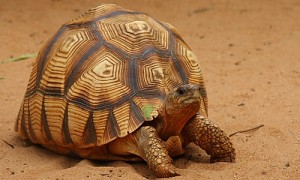 Unfortunately, females only start laying eggs after they reach 15 to 20 years of age, making conservation efforts even more difficult. Fertility rates and hatching success rates mean that only about 4 hatchlings are produced per season per female.
Unfortunately, females only start laying eggs after they reach 15 to 20 years of age, making conservation efforts even more difficult. Fertility rates and hatching success rates mean that only about 4 hatchlings are produced per season per female.
The current population is estimated at 600 individuals and is sadly still decreasing. They are therefore at an extremely high risk of extinction and researchers believe that these tortoises will become extinct in the wild within the next 15 years.
The tortoise’s main predator is the bush pig which was introduced into the area by man. The bush pig eats the tortoise’s eggs and young.
Included in the threats to the tortoise population is their collection for the pet trade (because of their attractive shell colourations) and the popular use of fires to clear grazing land for cattle. Luckily, conservation groups have created firebreaks through controlled fires which have led to the decrease in out of control fires.
Although there has been an increase of enforcement of the restrictions on illegal trade, they have remained in extremely high 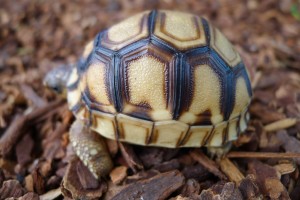 demand on the global pet market – a fully grown female tortoise was recently estimated to sell for $60,000 on the Asian black market.
demand on the global pet market – a fully grown female tortoise was recently estimated to sell for $60,000 on the Asian black market.
Conservationists have even begun engraving their shells with identifying marks to tarnish their most attractive feature and make them less desirable to poachers and collectors. This is a last-chance effort to try and protect them and is not dissimilar to the cutting of a rhino’s horn to make them less attractive to poachers. Engraving needs to be superficial though, no deeper than the keratin layer of the shell, so that it isn’t painful, but it still causes discomfort due to the trauma of the capture, etc., although it is worth it in the long run if it saves their life.
Conservationists have also developed captive breeding programs and conservation plans that include the community around their habitat. Communities around the tortoise’s habitat have started creating firebreaks and proposed the creation of a park to protect the tortoise and the forests.
Even with all of these improvements, close monitoring of the tortoise population and the global pet trade is still essential. As recently as 2013, smugglers were arrested carrying a single bag containing 54 Angonoka tortoises and 21 Radiated tortoises into Thailand. The 54 Angonoka tortoises could be as much as 10% of the world’s population of the species!
